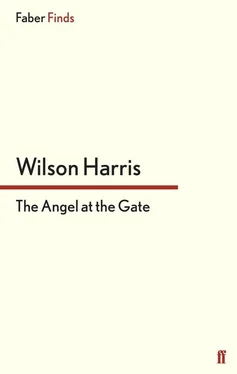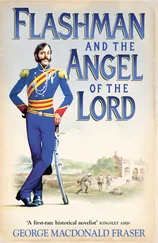Lucy Brown in India and Sukey Tawdrey in Paradise Park had taken the process a step farther. Infant bride had turned the clock topsy-turvy into infant bridegroom when Sukey Tawdrey appeared. But that was not all. Sukey Tawdrey’s eyes had fallen from her head to give weight to reversals of time in the womb of space. Infant bridegroom became infant cousin. And species of diminutive clock gleamed afresh upon Mary’s obsession with Sebastian as her twin, Stella’s husband. She had returned to this issue again. It was an obsession from which she was free or cured and yet here it was again! Sebastian her twin, Stella’s husband. Cured, yes, in one sense, but in another still susceptible to the disease. One may be cured of an illness and yet occasionally suffer a relapse. Perhaps that was what Stella had meant as they embraced each other in the street by the hospital when she said she would go but come again, come and go…. Never absolutely depart.
Every cure of body and mind was also the germ of an ailing eternity. Eternity ailed within Father Lucidity himself like a veil over the sun’s kingdom of returning wives and daughters and mothers. And this, Mary felt, was essential core of the world’s continuing pressure of need, pressure of care, pressure for the lost, the newfound mother. Every bitter crisis affecting the fabric of a desperate world revived the need and the pressure. It wasn’t just the matter of Stella’s return, occasional return, occasionally popping up here and there to lend a hand with John or Sebastian but something graver she (Mary) had partially evaded and must now face. Her lost mother was back even if she didn’t always turn up where one expected to find her and tended to play the oddest jokes about where she resided. The crisis her lost mother brought, the need in Mary that revived her into existence, was not one of race, racial antecedent. That fact was written into other apparitions, such as Sukey’s. Her mother was a different cup of tea! Her return to the scene was a signal of social, economic distress, of compulsive imageries of Mother Care in a bleak recession that Mary felt was part and parcel of aggravated neurosis within her bordering on an obsession with the nature of value in every sphere of life and death. It was good to see it, accept it. That was the illness in which, through which, lay the cure.
Paradoxes of lucidity, cups of tea, were essentials of truth in which what seemed health or disease in one light lent itself to subordination or submersion in another palate, the mighty globe to diminutive brides and bridegrooms across reaches of oceanic civilization, interrelated raw material kinships to the fauna and flora of human paradise. And all these were signals of Jenny Diver’s presence as an apparition not so much between herself and Sebastian (as Stella had been) — though she lay there as well — but between growing inequality and ailing equality, injustice and justice, within the vulnerable fathers of the human race to which she was joined in depths of economic and social crisis.
Mary turned and glanced again at Sebastian’s half-submerged body at her side in bed. His face and head seemed subtly eaten, oddly consumed, in the half-light and taut wave of shadow in the room. This was John’s father beyond a shadow of doubt … and yet so was Father Marsden (he was also John’s father), eaten beard, eaten treasuries of wisdom. She should have been logically repelled by the sight of Sebastian but found herself relating to him within the crisis he endured through Mother Diver’s shadowy arms around him in the sea of sleep. That Diver embrace, that oddly maternal and oceanic shadow upon him, was curiously processional as if it broke him into a multitude of little selves…. It made Mary jump a little — as a mother and a wife herself — to see Jenny Diver in that slumbering light and it raised Sebastian into heraldic procession as Mary recalled a number of sleepwalking faces and figures she had seen in the city that afternoon.
They too were creatures of the sea of disease, they too had that bitten, asleep look as if they were familiar with the most secret currents of vulnerable fatherhood, Father Equality and Father Inequality, within a tidal void — a current both empty and full — in which one sometimes subsided into the minimum of real decision, into the minimum of real insight, as prelude to increments of painful, sometimes half-tragic, sometimes half-abortive, yet slowly maturing perception of the riddle of the womb of age. Mother Diver would save all, would take care of every emergency in that subsidence or ebb tide, that riddle of crisis. Mother Diver was here in response to crisis.
To think of Jenny Diver like that seemed a bitchy way on the face of things, Mary felt, to recall her own mother who had vanished from sight twenty-odd years ago to return afresh now in a tide of depression that nibbled at unemployed Sebastian’s head. Bitch of necessity! Depression, economic and psychological, stimulated the return of a mother for all emergencies to seize upon equal and unequal fathers, Sovereign Father Money, Sovereign Father Gold, Sovereign Father Poverty.
Insatiable mother who seemed now to make starkly clear the inadequacies of Stella and herself! Mary shuddered, she stared at Sebastian. Her own father, she dimly recalled, had run away to live and die at sea. Perhaps Sebastian would learn to run…. Unless he could bear insatiable, eccentric Mother Freedom. And that reflection took Mary by surprise. It seemed a judgement of herself in respect of John, a timely reminder to desist from claustrophobic affection, claustrophobic order. The faces she had seen in the city seemed to move in circles just within or without a strictly designed circumference. The traffic too revolved in grooves or cycles within or without strict location or wheel. There was an indefinable edge, an indefinable tide, that lapped everywhere and drew one into unpredictable haven that was more pertinent than strict, unhappy queue. And that eccentricity seemed necessary. It cast a shadow of curative doubt, however pitiless, upon everything, a curious sense of the mother of freedom lurking everywhere in age-old fixation or diseased habit.
Mary was standing in a supermarket. It was perfectly familiar, rows of household utensils, toilet paper, food stalls and counters with expensive meats and fish, high-priced vegetables, fruit, haberdashery, garish paperbacks with guns and naked ladies, washing powder competing with washing powder, soap and lipstick competing with soap and lipstick. Everything was familiar except the eccentric emotion they engendered in her now, eccentric advertisement, manipulations of greed and appetite, sophistications of excess, sophistications of waste, sophistications of necessity; and through it all — despite it all — perception of Mother Quality as real however marred by brute fashion and uncertainty about the state of the world, its wealth, its poverty.
Shadow of curative doubt was one of the shawls Mother Diver wore to give substance to eccentric insistence on freedom of choice, and to imply unwittingly perhaps that no fact or feature compelled her to pander to self-indulgent daughter or son; her genuine cares therefore were strangely solemn love, even supernatural resolution — on one hand — against nature as brute law and — on the other — a brooding uncertainty about the metaphysical quality of qualities that creates just competition (the justice of intelligent and true competition) as superior in Mother Blood to Thieves’ Manifesto, dreaded Communist Manifesto. Even so, in pursuit of “quality of qualities”, a metaphysic of curative doubt — planted in carnival, diseased quantities for sale in the marketplace/supermarket of history — made Mary wonder at distinctions hidden but resident in Mother Blood, Mother Dread. Could theft by the rich from the poor, by the poor from the rich, possess a metaphysical justification? Was the theft of fire from the gods justified? Were the gods truly rich or truly poor sons of space, Jupiter, Saturn, and others?
Читать дальше












